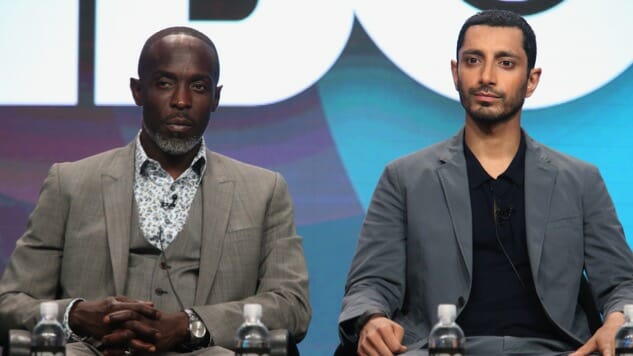7 Things We Learned from the Cast and Creatives of The Night Of

The eight-part HBO miniseries The Night Of is a slow-burning whodunit that’s more interested in the cultural, racial and socio-political aspects of crime in America than solving the mystery itself—setting itself apart from other law and order dramas. Loosely based on the BBC series Criminal Justice, the American version was created by Richard Price and Steve Zaillian, who also served as executive producers. The two shared the writing responsibilities, with Zaillian and James Marsh (The Theory of Everything) divvying up the directing.
The Night Of starts with a bang, as college student Naz Khan (Riz Ahmed), a Pakistani American, borrows his father’s cab to get to a party. Outside of his Queens comfort zone, he’s hailed by Andrea (Sofia Black D’Elia), a troubled party girl who doesn’t want to be alone. After a night of sex and drugs, Naz wakes up in a haze to find Andrea stabbed to death in the bedroom. With no recollection of what happened, he runs. Eventually, Naz is arrested and is represented by a seedy lawyer, Jack Stone (John Turturro).
Over the course of the series, viewers watch Stone look for ways to free his client, while Naz’s family—particularly his father Salim Khan (Peyman Moaadi) and mother (Poorna Jagannathan)—stand by, helpless. Naz is a Muslim, which garners him no favors in the press or during his incarceration at Rikers Island, awaiting trial. In jail, Naz is taught how to survive by Freddy (Michael K. Williams), a beloved and feared boxer, and the king of Rikers. Regardless of his trial’s outcome, Naz’s life has forever changed.
At a recent screening event for The Night Of in West Hollywood, Zaillian was joined by cast members Ahmed, Williams and Jagannathan for a panel discussion about the show, where they discussed, among other things, their thoughts on racism and incarceration America.
Here’s what we learned during the event, and in a greenroom interview session with the panelists.
1. Timing is everything.
The Night Of feels especially current and relevant during this time of Trump, with its strong undercurrent of anti-Muslim, anti-”other” sentiment in America, but the series was actually written and developed more than seven years ago with the Jack Stone role written for James Gandolfini (who posthumously receives executive producer credit on the show).
“It’s dropping at a time that it’s needed. It feels cosmic more than anything. There is so much at stake right now,” Jagannathan said. “Some of the things that the show deals with, they’ve always [been] there,” Zaillian added. “But they’re just in the press more now—certainly in terms of certain parts of the justice system, and Rikers Island, in particular. We were writing about things that the press didn’t even know about. We were going [to Rikers] and were talking to people who had been there. When the stories started coming out, then we were like, ‘Finally, maybe something’s going to be done here.’”
![]()
2. How Rikers Island developed into a character…
Rikers Island is both an island and the name of New York City’s main jail facility, serving as a living tomb for those imprisoned inside. “I don’t think either one of us had any idea of what Rikers was like until we went there,” Zaillian said, speaking of himself and Price. “It’s a harrowing place. It has a lot of problems, and I don’t know what the solution is. It became, naturally, a bigger part of the story than when we were first starting.” The executive producers insisted that their team—including DPs, production designers, actors and others—visit the jail. “We had to get it right every step of the way.”
Impressed upon Zaillian was learning how a stint in Rikers can change a prisoner forever—a metamorphosis that we witness in Raz in The Night Of. “One thing that troubles me is that you have to stay there so long before anything happens, and terrible things can happen to you while you’re waiting,” he said. “You can be innocent of any crime, and [if] you don’t have money for bail, you are in big, big trouble. And you’ll probably be changed for life whether you did the crime or not. There’s something wrong with that. There’s something wrong with keeping someone in there for three years on suspicion for having done something.”
![]()